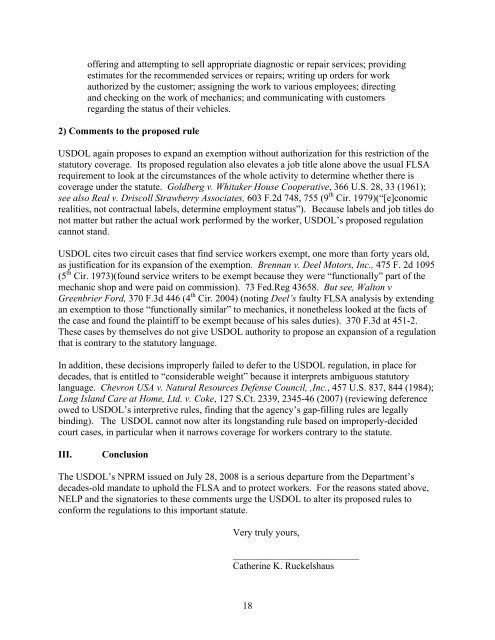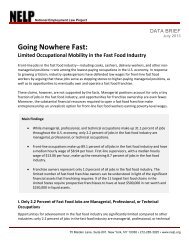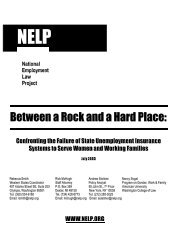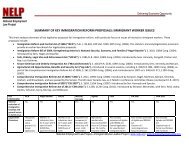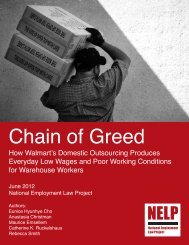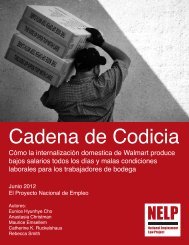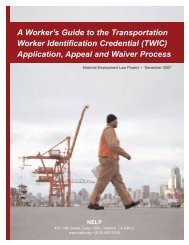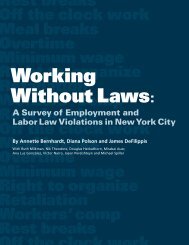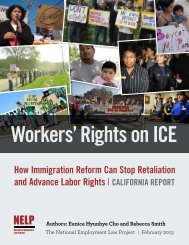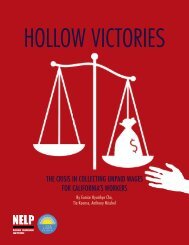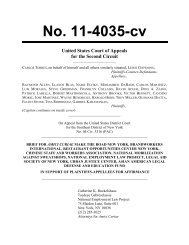National Employment Law Project
National Employment Law Project
National Employment Law Project
Create successful ePaper yourself
Turn your PDF publications into a flip-book with our unique Google optimized e-Paper software.
offering and attempting to sell appropriate diagnostic or repair services; providing<br />
estimates for the recommended services or repairs; writing up orders for work<br />
authorized by the customer; assigning the work to various employees; directing<br />
and checking on the work of mechanics; and communicating with customers<br />
regarding the status of their vehicles.<br />
2) Comments to the proposed rule<br />
USDOL again proposes to expand an exemption without authorization for this restriction of the<br />
statutory coverage. Its proposed regulation also elevates a job title alone above the usual FLSA<br />
requirement to look at the circumstances of the whole activity to determine whether there is<br />
coverage under the statute. Goldberg v. Whitaker House Cooperative, 366 U.S. 28, 33 (1961);<br />
see also Real v. Driscoll Strawberry Associates, 603 F.2d 748, 755 (9 th Cir. 1979)(“[e]conomic<br />
realities, not contractual labels, determine employment status”). Because labels and job titles do<br />
not matter but rather the actual work performed by the worker, USDOL’s proposed regulation<br />
cannot stand.<br />
USDOL cites two circuit cases that find service workers exempt, one more than forty years old,<br />
as justification for its expansion of the exemption. Brennan v. Deel Motors, Inc., 475 F. 2d 1095<br />
(5 th Cir. 1973)(found service writers to be exempt because they were “functionally” part of the<br />
mechanic shop and were paid on commission). 73 Fed.Reg 43658. But see, Walton v<br />
Greenbrier Ford, 370 F.3d 446 (4 th Cir. 2004) (noting Deel’s faulty FLSA analysis by extending<br />
an exemption to those “functionally similar” to mechanics, it nonetheless looked at the facts of<br />
the case and found the plaintiff to be exempt because of his sales duties). 370 F.3d at 451-2.<br />
These cases by themselves do not give USDOL authority to propose an expansion of a regulation<br />
that is contrary to the statutory language.<br />
In addition, these decisions improperly failed to defer to the USDOL regulation, in place for<br />
decades, that is entitled to “considerable weight” because it interprets ambiguous statutory<br />
language. Chevron USA v. Natural Resources Defense Council, ,Inc., 457 U.S. 837, 844 (1984);<br />
Long Island Care at Home, Ltd. v. Coke, 127 S.Ct. 2339, 2345-46 (2007) (reviewing deference<br />
owed to USDOL’s interpretive rules, finding that the agency’s gap-filling rules are legally<br />
binding). The USDOL cannot now alter its longstanding rule based on improperly-decided<br />
court cases, in particular when it narrows coverage for workers contrary to the statute.<br />
III. Conclusion<br />
The USDOL’s NPRM issued on July 28, 2008 is a serious departure from the Department’s<br />
decades-old mandate to uphold the FLSA and to protect workers. For the reasons stated above,<br />
NELP and the signatories to these comments urge the USDOL to alter its proposed rules to<br />
conform the regulations to this important statute.<br />
Very truly yours,<br />
__________________________<br />
Catherine K. Ruckelshaus<br />
18


